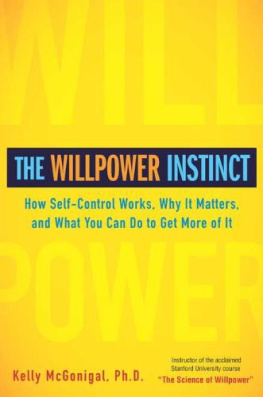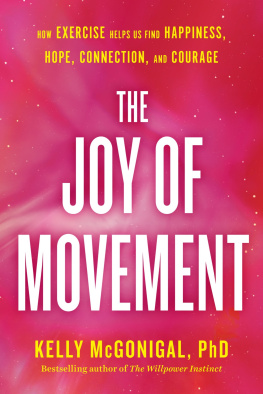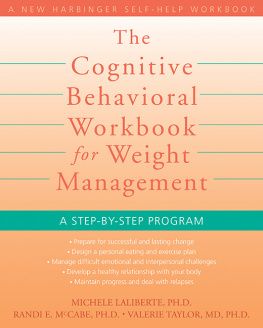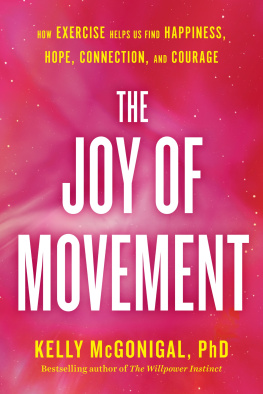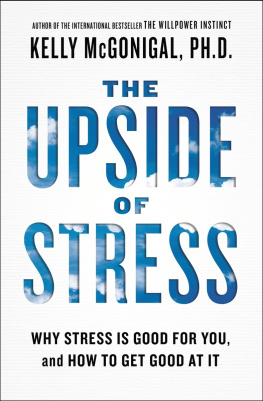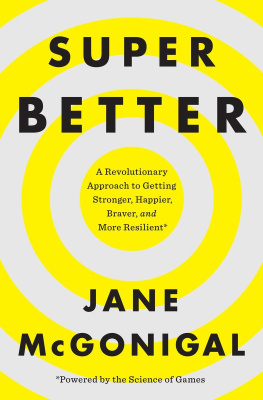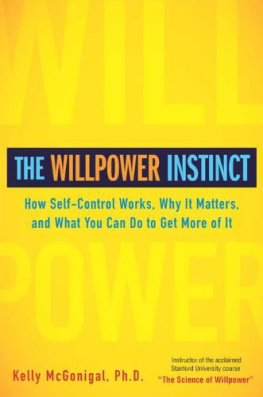Table of Contents
Published by the Penguin Group
Penguin Group (USA) Inc., 375 Hudson Street, New York, New York 10014, USA Penguin Group
(Canada), 90 Eglinton Avenue East, Suite 700, Toronto, Ontario M4P 2Y3, Canada (a division
of Pearson Penguin Canada Inc.) Penguin Books Ltd, 80 Strand, London WC2R 0RL,
England Penguin Ireland, 25 St Stephens Green, Dublin 2, Ireland (a division of Penguin
Books Ltd) Penguin Group (Australia), 250 Camberwell Road, Camberwell, Victoria 3124,
Australia (a division of Pearson Australia Group Pty Ltd) Penguin Books India Pvt Ltd,
11 Community Centre, Panchsheel Park, New Delhi110 017, India Penguin Group (NZ),
67 Apollo Drive, Rosedale, North Shore 0632, New Zealand (a division of
Pearson New Zealand Ltd) Penguin Books (South Africa) (Pty) Ltd,
24 Sturdee Avenue, Rosebank, Johannesburg 2196, South Africa
Penguin Books Ltd, Registered Offices: 80 Strand, London WC2R 0RL, England
Copyright 2012 by Kelly McGonigal, Ph.D.
All rights reserved. No part of this book may be reproduced, scanned, or distributed in any
printed or electronic form without permission. Please do not participate in or encourage piracy
of copyrighted materials in violation of the authors rights. Purchase only authorized editions.
Published simultaneously in Canada
Brain illustrations by Tina Pavlatos, Visual Anatomy Limited
Current Self v. Future Self scale courtesy Hal Ersner-Hershfield and Jon Baron
Most Avery books are available at special quantity discounts for bulk purchase for sales promotions, premiums, fund-raising, and educational needs. Special books or book excerpts also can be created to fit specific needs. For details, write Penguin Group (USA) Inc. Special Markets, 375 Hudson Street, New York, NY 10014.
Library of Congress Cataloging-in-Publication Data
McGonigal, Kelly.
The willpower instinct : how self-control works, why it matters, and what you can do to
get more of it / Kelly McGonigal.
p. cm.
ISBN : 978-1-101-55373-2
1. Will. 2. Self-control. I. Title.
BF632.M
153.8dc23
All names and identifying characteristics have been changed to protect the privacy of the individuals involved.
Neither the publisher nor the author is engaged in rendering professional advice or services to the individual reader. The ideas, procedures, and suggestions contained in this book are not intended as a substitute for consulting with your physician. All matters regarding your health require medical supervision. Neither the author nor the publisher shall be liable or responsible for any loss or damage allegedly arising from any information or suggestion in this book.
While the author has made every effort to provide accurate telephone numbers and Internet addresses at the time of publication, neither the publisher nor the author assumes any responsibility for errors, or for changes that occur after publication. Further, the publisher does not have any control over and does not assume any responsibility for author or third-party websites or their content.
http://us.penguingroup.com
This book is dedicated to everyone who has ever struggled with temptation, addiction, procrastination, or motivationwhich is to say, all of us.
The intelligent want self-control; children want candy.
RUMI
INTRODUCTION
Welcome to Willpower 101
W henever I mention that I teach a course on willpower, the nearly universal response is, Oh, thats what I need. Now more than ever, people realize that willpowerthe ability to control their attention, emotions, and desiresinfluences their physical health, financial security, relationships, and professional success. We all know this. We know were supposed to be in control of every aspect of our lives, from what we eat to what we do, say, and buy.
And yet, most people feel like willpower failuresin control one moment but overwhelmed and out of control the next. According to the American Psychological Association, Americans name lack of willpower as the number-one reason they struggle to meet their goals. Many feel guilty about letting themselves and others down. Others feel at the mercy of their thoughts, emotions, and cravings, their lives dictated by impulses rather than conscious choices. Even the best-controlled feel a kind of exhaustion at keeping it all together and wonder if life is supposed to be such a struggle.
As a health psychologist and educator for the Stanford School of Medicines Health Improvement Program, my job is to help people manage stress and make healthy choices. After years of watching people struggle to change their thoughts, emotions, bodies, and habits, I realized that much of what people believed about willpower was sabotaging their success and creating unnecessary stress. Although scientific research had much to say that could help them, it was clear that these insights had not yet become part of public understanding. Instead, people continued to rely on worn-out strategies for self-control. I saw again and again that the strategies most people use werent just ineffectivethey actually backfired, leading to self-sabotage and losing control.
This led me to create The Science of Willpower, a class offered to the public through Stanford Universitys Continuing Studies program. The course brings together the newest insights about self-control from psychology, economics, neuroscience, and medicine to explain how we can break old habits and create healthy habits, conquer procrastination, find our focus, and manage stress. It illuminates why we give in to temptation and how we can find the strength to resist. It demonstrates the importance of understanding the limits of self-control, and presents the best strategies for training willpower.
To my delight, The Science of Willpower quickly became one of the most popular courses ever offered by Stanford Continuing Studies. The first time the course was offered, we had to move the room four times to accommodate the constantly growing enrollment. Corporate executives, teachers, athletes, health-care professionals, and others curious about willpower filled one of the largest lecture halls at Stanford. Students started bringing their spouses, children, and coworkers to class so they could share the experience.
I had hoped the course would be useful to this diverse group, who came to the class with goals ranging from quitting smoking and losing weight to getting out of debt and becoming a better parent. But even I was surprised by the results. A class survey four weeks into the course found that 97 percent of students felt they better understood their own behavior, and 84 percent reported that the class strategies had already given them more willpower. By the end of the course, participants told stories of how they had overcome a thirty-year addiction to sweets, finally filed their back taxes, stopped yelling at their children, stuck to an exercise program, and generally felt better about themselves and more in charge of their choices. Course evaluations called the class life-changing. The consensus of the students was clear: Understanding the science of willpower gave them strategies for developing self-control, and greater strength to pursue what mattered most to them. The scientific insights were as useful for the recovering alcoholic as the e-mail addict, and the self-control strategies helped people resist temptations as varied as chocolate, video games, shopping, and even a married coworker. Students used the class to help meet personal goals such as running a marathon, starting a business, and managing the stresses of job loss, family conflict, and the dreaded Friday morning spelling test (thats what happens when moms start bringing their kids to class).

